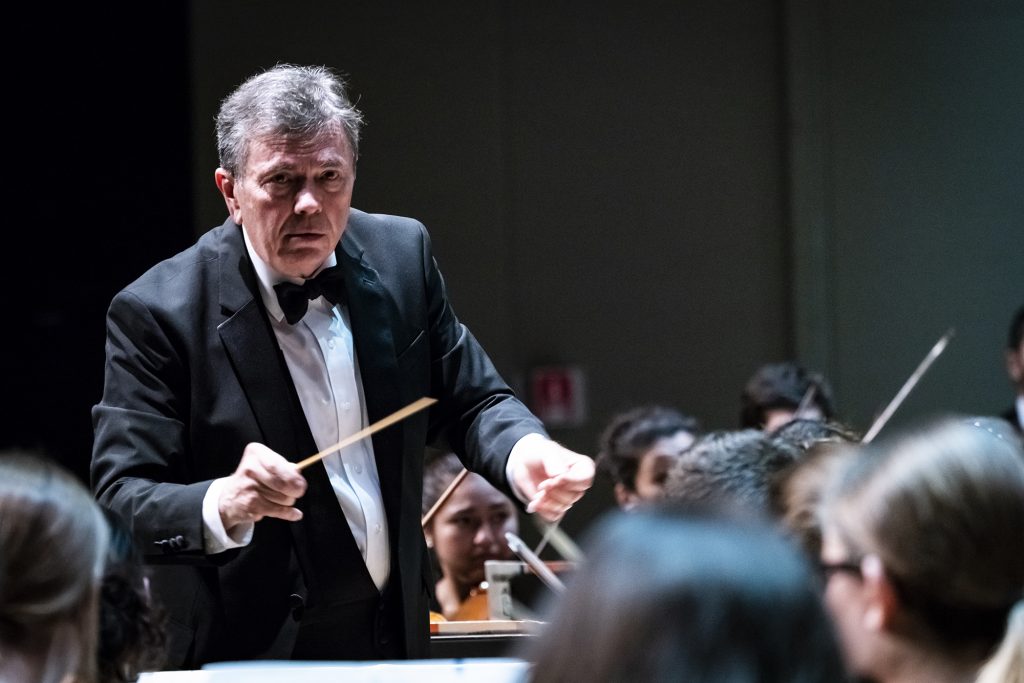Schwarz opens Frost season with probing Brahms and an American classic

Gerard Schwarz conducted the Frost Symphony Orchestra in music of Tower, Schuman and Brahms Saturday night.
William Schuman was one of America’s most important figures in classical music during much of the twentieth century. He was best known in his lifetime as president of the Juilliard School (where he co-founded the renowned Juilliard String Quartet) and founding president of Lincoln Center for the Performing Arts. Yet Schuman’s greatest contribution was as a composer, particularly his ten symphonies and concerted works for violin, cello and viola.
In 1956 Schuman was commissioned by conductor Andre Kostelanetz to create New England Triptych, a three-movement suite after hymns and chorales by 18th-century colonial composer William Billings. The work was premiered by what was then called the University of Miami Symphony Orchestra.
Schuman’s opus was the centerpiece of the Frost Symphony Orchestra’s season-opening program Saturday night at UM Gusman Concert Hall under the direction of Gerard Schwarz. Schuman’s elaboration of Billings’ melodies adds bristling sinew to the instrumental fabric. Both rousing and dramatic, the score is a bona fide American classic.
Under Schwarz’s baton, the student players often have punched above their weight in performance, and this was certainly the case in the Schuman. The cellos sounded the theme of “Be Glad Then, America” with strength and the brass fanfares were cleanly articulated. Schwarz brought clarity to individual instrumental passages and his swift pacing brought out the revolutionary spirit of Billings’ anthems.
The spare lines of “When Jesus Wept” were eloquently shaped, highlighted by a ruminative oboe solo and vibrant strings. The winds spaciously intoned the anthem “Chester” but there was plenty of rhythmic punch in the brass fanfares and angular wind variations. The final pages emerged appropriately blazing and triumphant. Schwarz conveyed great idiomatic affinity for Schuman’s terse idiom and one hopes he will program this important American composer’s symphonies (which he has recorded) in future concerts.
The program opened with Joan Tower’s Fanfare for the Uncommon Woman No. 6. Modeled after Aaron Copland’s famous wartime Fanfare for the Common Man, Tower’s overture cum fanfare (dedicated to conductor Marin Alsop) abounds in minimalist figurations from winds and brass with a very active percussion contingent. The fanfare is more in the vein of Philip Glass or Steve Reich than Tower’s usual lyrical style, and was played with energy and thrust.
Brahms’ Symphony No. 4 in E minor may be a repertoire standard but there was nothing hackneyed about Schwarz’s buoyant reading which comprised the concert’s second half. Except for a few fleeting slips in the winds and horns, the ensemble’s playing was vibrant, rich and precise. In the first movement, Schwarz’s flowing, measured tempo and high sense of contrasted dynamics gave full sway to the music’s drama and passion. With solid proclamation from solo horn and winds, the principal subject of the Andante moderato was given songful impetus. Schwarz drew out the aching beauty of the secondary theme. With ten double basses at stage left, the dark Brahmsian undertow of lower strings had real presence.
Schwarz took a brisk, no-nonsense approach to the Allegro giocoso (third movement). It remains astonishing that, in the twilight of his symphonic writing, Brahms turned to the Baroque passacaglia as the basis of the finale of his last symphony. This movement poses challenges to conductor and players. It can easily become plodding and diffuse. Schwarz’s driving tempo avoided those pitfalls. The initial statement of the theme was crisply accomplished, and the prominent flute solo beautifully intoned. Trombones had rounded sonority in the big chorale section. Keeping the momentum highly charged, Schwarz brought the layered thematic strands to a grand climax.
An admirably quiet audience, which refrained from applause between movements, awarded conductor and players cheers and repeated curtain calls. Although the musicians had been working together for only a few weeks, this opening concert was a vivid demonstration of the strength of the Frost School’s orchestral program and Schwarz’s skill in drawing the best from the students.
Gerard Schwarz conducts the Frost Symphony Orchestra in Ellen Taaffe Zwilich’s Celebration Overture, Ravel’s Daphnis and Chloé Suites 1 and 2 and a piano concerto TBA with FSO concerto competition winner. 7:30 p.m. October 28 at UM Gusman Concert Hall. frostmusiclive.com
Posted in Performances
Leave a Comment
Sun Sep 24, 2023
at 11:28 am
No Comments